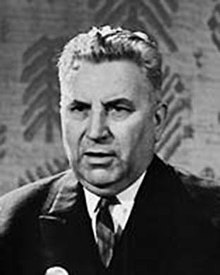Edward Ochab
Edward Mieczysław Ochab (born August 16, 1906 in Krakow , then Austria-Hungary , † May 1, 1989 in Warsaw ) was a Polish politician and general .
Life
Ochab was the son of a police officer. At the age of 12 he was already working in a print shop next to school. He later studied economics as a student trainee , graduating from the Jagiellonian University in Krakow in 1927 . In 1928 Ochab was called up for military service, should become an officer. Because of "subversive, pro-communist activities" he was expelled from the military school.
In 1929 Ochab joined the Communist Party of Poland , which was illegal at the time , and was arrested several times in the following period. Probably because he was also in custody in 1938, he survived the purge and dissolution of the party by Stalin . Between 1939 and 1944 he stayed in the Soviet Union and joined the Red Army as a volunteer in 1941 . He was one of the co-organizers of the Związek Patriotów Polskich (ZPP; "Union of Polish Patriots") and the Berling Army .
From 1945 to 1946 Ochab was a member of the Central Committee of the PPR , from 1950 to 1956 and from 1959 to 1964 that of the PVAP . Initially active as Minister for Public Administration, he was sent to Katowice as First Party Secretary between 1946 and 1948 , where he a. a. built up the cooperative system. In the meantime appointed general, from 1949 to 1950 he was Deputy Minister of Defense and Head of the Political Department of the Polish People's Army .
After Bolesław Bierut's sudden death in Moscow, the Politburo elected him in March 1956 as a compromise candidate as the new party leader. In this function he prevented the Red Army from marching into the country based on the Hungarian model (→ Hungarian People's Uprising ). After the Poznan uprising , in October 1956 he handed over the chairmanship to Władysław Gomułka , for whose rehabilitation he had previously campaigned. In the following years Ochab was Minister of Agriculture (1957-1959), Deputy State Council Chairman (1961–1964) and State Council Chairman (1964–1968). As a result of the anti-Semitic policy of 1968 after the student riots in March of that year , Ochab withdrew from the leadership because he could not reconcile this policy with communist internationalism.
Ochab died on May 1, 1989 at the age of 82 in Warsaw. He had only just witnessed the political upheaval in Poland .
literature
- Ochab, Edward . In: Werner Markert (Ed.): Eastern Europe Handbook. Poland. Böhlau, Cologne 1959.
Web links
- Edward Ochab in the Munzinger archive ( beginning of article freely accessible)
Individual evidence
- ^ Biuletyn Informacji Publicznej Instytutu Pamięci Narodowej. In: ipn.gov.pl. Retrieved March 19, 2019 (Polish).
- ↑ Edward Ochab in the Munzinger archive ( beginning of article freely accessible)
- ↑ Elmar Altvater : “We'll win the last battle!” 40 years 1968 - balance sheet and perspectives. Die Linke.SDS (Ed.), VSA-Verlag, Hamburg 2008, ISBN 978-3-89965-315-1 , p. 181: “The chairman of the People's Assembly, Edward Ochab, felt the anti-Semitic persecution was not with his internationalist convictions compatible as a communist and resigned. "
- ↑ Edward Ochab passed away . In: Neues Deutschland , May 3, 1989 (Wednesday): "[...] died on Monday [...]". Retrieved February 1, 2014.
- ^ Edward Ochab in the Munzinger Archive ( beginning of the article freely available): Obviously wrong in the introduction † May 2, 1989, but at the end of the article † May 1, 1989.
| personal data | |
|---|---|
| SURNAME | Ochab, Edward |
| ALTERNATIVE NAMES | Ochab, Edward Mieczysław (full name) |
| BRIEF DESCRIPTION | Polish politician and general |
| DATE OF BIRTH | August 16, 1906 |
| PLACE OF BIRTH | Krakow |
| DATE OF DEATH | May 1, 1989 |
| Place of death | Warsaw |
